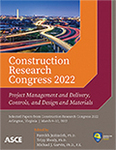LEED Assessment of Green Lightweight Concrete Containing Plastic Based Aggregates in Construction
Publication: Construction Research Congress 2022
ABSTRACT
The overexploitation of natural aggregates renders their use in concrete as unsustainable resources. Because of that, researchers have been studying the use of processed aggregates in concrete. However, little has been reported on how using such aggregates affects the building’s sustainability in terms of the LEED certification. This study aims to explore the benefits of using green processed lightweight aggregate (PLA) by determining the LEED requirement for Building Design and Construction and providing a comprehensive analysis of LEED credits based on the existing technical materials data. This study focuses more on the environmental benefits and provides analysis on how material properties affect its sustainability in a quantitative measure, which is the LEED scoring. The findings indicate that the use of PLA as a replacement for aggregate in lightweight concrete contributes significantly to 8 points out of 110 required in LEED certification. In addition, the paper provides the guidelines that enable developers and stakeholders in the construction industry to improve the financial and environmental benefits of using recycled materials for building and increase LEED scores toward sustainable development.
Get full access to this article
View all available purchase options and get full access to this chapter.
REFERENCES
AEA Group. (2011) Plastic Waste in the Environment: Revised Final Report; IEEP: Paris, France.
Alqahtani, F. K., Khan, M. I., and Ghataora, G. (2014) Synthetic Aggregate for Use in Concrete., 30 December.
Alqahtani, F. K., Ghataora, G., Khan, M. I., and Dirar, S. (2017) Novel lightweight concrete containing manufactured plastic aggregate. Constr. Build. Mater., 148, 386–397.
Alqahtani, F. K., Khan, M. I., Ghataora, G., and Dirar, S. (2018) Production of Recycled Plastic Aggregates and Its Utilization in Concrete. J. Mater. Civ. Eng., 29, 04016248.
Alqahtani, F. K., and Zafar, I. (2020) Characterization of Processed Lightweight Aggregate and Its Effect on Physical Properties of Concrete. Constr. Build. Mater., 230, 116992.
Babafemi, A. J., Šavija, B., Paul, S. C., and Anggraini, V. Engineering Properties of Concrete with Waste Recycled Plastic: A Review. (2018) Sustainaibility, 10, 3875.
Ersan, Y. C., Gulcimen, S., Imis, T. N., Saygin, O., and Uzal, N. (2020) Life Cycle Assessment of Lightweight Concrete Containing Recycled Plastics and Fly ash. European Journal of Environmental and Civil Engineering., 1–14.
Evangelista, L., Guedes, M., de Brito, J., Ferro, A. C., and Pereira, M. F. (2015) Physical, Chemical and Mineralogical Properties of Fine Recycled Aggregates Made from Concrete Waste. Constr. Build. Mater., 86, 178–188.
Gettu, R., Pillai, R. G., Santhanam, M., Basavaraj, A. S., Rathnarajan, S., and Dhanya, B. S. (2018) Sustainability-based decision support framework for choosing concrete mixture proportions. Mater. Struct., 51, 165–181.
Ghanbari, M., Abbasi, A. M., and Ravanshadnia, M. (2017) Economic and Environmental Evaluation and Optimal Ratio of Natural and Recycled Aggregate Production. Adv. Mater. Sci. Eng., 1–10.
KACST Saudi Patent. (2015) 3960, Synthetic Aggregate for Use in Concrete.
Karim, Y., Khan, Z., Alsoufi, M. S., and Yunus, M. (2016) A Review on Recycled Aggregates for the Construction Industry. Am. J. Civ. Eng. Arch., 4, 27–33.
Marzouk, O. Y., Dheilly, R. M., and Queneudec, M. (2007). Valorization of post-consumer waste plastic in cementitious concrete composites. Waste Management, 27(2), 310–318.
Saikia, N., and De Brito, J. (2014). Mechanical properties and abrasion behaviour of concrete containing shredded PET bottle waste as a partial substitution of natural aggregate. Construction and Building Materials, 52, 236–244.
Sonbul, A. R., and Abu Seif, E.-S. S. (2019) Geotechnical Performance of Sandy Bricks Made with Fine Aggregates of Sand Dunes, Saudi Arabia. Arab. J. Geosci., 12, 1–14.
Swe, T. M., Jongvivatsakul, P., and Pansuk, W. (2016). Properties of Pervious Concrete Aiming for LEED Green Building Rating System Credits. Engineering Journal., 20. 61–72.
Thongkamsuk, P., Tondee, T., and Sudasna, K. (2017) Waste generated in high-rise buildings construction: A current situation in Thailand. Energy Procedia, 138, 411–416.
Turk, J., Cotic, Z., Mladenovic, A., and Sajna, A. (2015). Environmental Evaluation of Green Concretes Versus Conventional Concrete by Means of LCA. Waste Management (New York, N.Y.), 45, 194–205.
United States Patent. (2014), Synthetic Aggregate for Use in Concrete.
USGBC. (2020) LEED v4.1: Building Design and Construction; USGBC, Washington, DC.
VanGeem, M. (2006) Achieving Sustainability with Precast Concrete. PCI Journal., 51, 42–61.
Information & Authors
Information
Published In
History
Published online: Mar 7, 2022
Authors
Metrics & Citations
Metrics
Citations
Download citation
If you have the appropriate software installed, you can download article citation data to the citation manager of your choice. Simply select your manager software from the list below and click Download.
